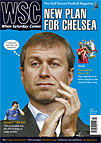 FC Vaduz have become unwelcome guests in the Swiss top flight, writes Paul Joyce
FC Vaduz have become unwelcome guests in the Swiss top flight, writes Paul Joyce
The 35,365 citizens of Liechtenstein, the principality of only 62 square miles wedged between Switzerland and Austria, barely raised an eyebrow in March 2007 when Swiss troops on exercise mistakenly wandered into their country. An invasion in the other direction, however, is currently proving more controversial.
Liechtenstein’s clubs have played in the lower reaches of the Swiss pyramid since 1932, as there are too few (seven, since 1972) to form their own national league. Yet it wasn’t until 2001 that FC Vaduz, from the nation’s capital, reached their neighbour’s second division for the first time. After narrow play-off defeats in 2004 and 2005, Vaduz secured direct promotion to the Swiss top flight in May 2008. Coached by Heinz Hermann, who made a record 117 appearances for Switzerland, FCV lost only one of their last 20 matches. But the Swiss Super League’s first foreign guests have not been welcomed with open arms. “Every day spent by Vaduz in our top division will damage Swiss football,” declared a fan on an FC Basel website. “And Vaduz is strong enough to damage Swiss football for many years to come.”
Located in a tax haven with the world’s highest per capita GDP, FC Vaduz’s budget of 4.6 million Swiss francs was by far the biggest in this year’s Challenge League. Next season’s figure could rise to eight million due to backing from Liechtenstein’s national bank, LLB, and investment firm MBPI. Although Liechtenstein’s banks have been implicated in recent tax-fraud scandals, Swiss fans’ insinuations about the potentially dubious nature of FC Vaduz’s funding seem hypocritical in view of their own clubs’ financial creativity. FC Wil president Andreas Hafen was sentenced to five years in prison in 2006 for embezzling 51 million francs from the Swiss bank UBS.
In May 2004, the Super League required FCV to sign an agreement that imposed strict conditions on any top-flight participation. Before the start of the 2008-09 season, they must pay an “entrance fee” of 250,000 francs and will not receive their full share of TV and marketing revenue. Nor will they receive funding for developing young players.
Contrary to reports, FC Vaduz would be allowed to call themselves Swiss champions if they came top. They could not claim a Swiss berth in the Champions League or UEFA Cup, however. This is because FCV are already guaranteed a UEFA Cup spot if they win the Liechtenstein Cup, a trophy they have won 11 years in a row. FCV’s recent UEFA Cup successes (including the elimination of Hungary’s Újpest FC in 2006) mean that Liechtenstein’s national coefficient would theoretically entitle the principality to a berth in the Champions League qualifiers – if only it had its own league.
In truth, Vaduz would be pleased just to avoid relegation. Although sporting director Werner Gerber guided minnows FC Thun to the Champions League in 2005, FCV’s budget is a mere fraction of that of title-winners FC Basel. Accusations that their promotion will harm the development of young Swiss players seem equally unfounded. Vaduz had no fewer than eight Swiss passport-holders in their squad this year, including 19-year-old regular goalkeeper Yann Sommer, who was only third in line at FC Basel.
The presence of only five nationals of their own country in the current Vaduz squad led Liechtenstein politician Paul Vogt to complain that the club was “basking in the reflected glory of expensively imported foreign professionals”. But although Vaduz wouldn’t have won promotion without the 31 goals of Brazilian striker Gaspar, their second-highest scorer was young Liechtenstein forward Benjamin Fischer. FCV players also contributed strongly to Liechtenstein’s Euro 2008 qualifying campaign, which included victories against Latvia and Iceland.
Unease at FC Vaduz’s ascent is rooted more in hard-nosed commercialism than nationalism. The Swiss Super League would much rather see slumbering giants such as Servette or Lugano gain promotion than a well run and likeable “village team” with an average attendance of 1,217, a mere 300 of whom turned up at the club’s Rheinpark Stadium in May to greet the new second-division champions. In a scene that sums up the curious mixture of provincialism and high finance that surrounds the club, FCV players were ferried to Vaduz town hall by the local fire engine to receive symbolic gifts of an umbrella, a fountain pen – and gold.
From WSC 257 July 2008